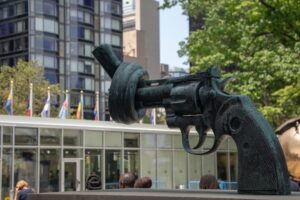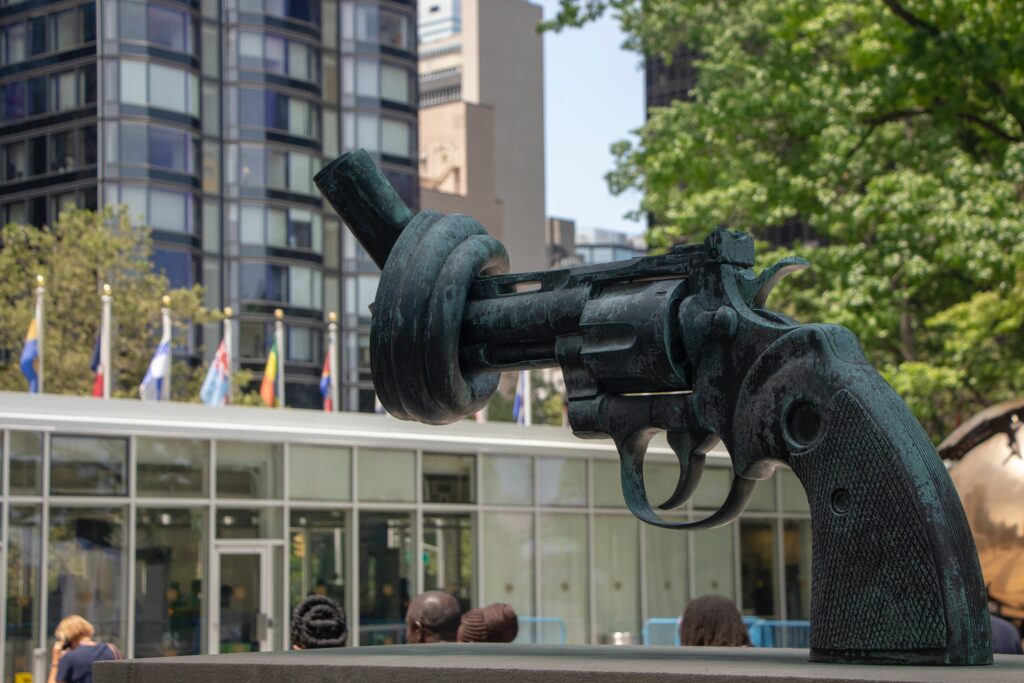By: Charlie Ellis
Forgiveness seems to be an obsolete virtue in modern American society. With the rise of cancel-culture on social media[1] and a country with polarization metrics higher than any point in the last twenty years,[2] “forgiveness” and “civility” are merely buzzwords for two sides who only wish to point out flaws in their opponent. In the midst of a growing national divide, North Carolina’s legislature passed Senate Bill 562 (“the Act”) in an attempt to help individuals with a past criminal record secure civil rights. The Act significantly expands expungement opportunities for these citizens and shines as a beacon of bipartisan hope and forgiveness in the dark world of American politics.[3] One of the Act’s most significant aspects is a new avenue for expungement beneficiaries to access one of America’s most fundamental rights: the right to bear arms.
North Carolina’s Department of Public Safety (“NCDPS”) describes their mission as “the administration of a fair and humane system which provides reasonable opportunities for adjudicated offenders to develop progressively responsible behavior”[4] and to provide “opportunities for offenders to become productive citizens.”[5] One significant characteristic of becoming a “productive citizen” is access to the essential rights provided to all Americans within the Constitution. North Carolina allows adjudicated offenders access to the majority of fundamental rights, such as voting, immediately upon completion of a sentence.[6] However, public policy considerations led North Carolina’s legislature to infringe on the essential right of self-protection by forcing non-violent offenders to wait twenty years for restoration of their firearm rights.[7] Although the Act does not specifically address gun rights, access to an expungement at an earlier date provides these same non-violent offenders with the ability to obtain firearms before the previously required twenty year mark.[8]
The only other avenue to firearm restoration available under North Carolina law is to apply for an expungement.[9] An expungement completely wipes a conviction off of the offender’s record and allows the individual to live their life as if the offense never occurred.[10] Before the Act, an applicant could expunge a non-violent misdemeanor or felony but had to certify that “other than the conviction(s) listed above, I have not been convicted of any felony or misdemeanor.”[11] Basically, the expungement was limited only to the single charge and was severely restricted in the scope of its application.[12] Problems continually arose for individuals seeking expungements that had a prior adjudication to the charge they wished to expunge. For firearm rights, this precluded some non-violent offenders from a full restoration for far too long. G.S. 14–415.4 requires a person to fill out a “Petition and Order for Restoration of Firearm Rights,” which dictates the adjudicated offender’s citizenship rights have been restored for twenty years prior to submission.[13] The Act now provides a solution to these problems allowing for an expungement of multiple misdemeanors after a seven-year period with no other convictions and does not preclude a felony expungement if an individual has prior misdemeanor convictions.[14] While the Act does not necessarily expand the category of people eligible to eventually obtain full firearm rights, it can expedite the process for those individuals by ten years.[15]
North Carolina concealed carry permits are heavily regulated for any person attempting to carry a protective firearm, and a citizen seeking a permit must endure an arduous application process.[16] North Carolina’s concealed carry law requires a person twenty-one years or older to participate in a gun safety course that “involves actual firing of handguns and instruction in the laws of this State governing the carrying of a concealed handgun and the use of deadly force.”[17] If the applicant has previously been adjudicated of a felony in any court, the applicant may not immediately have their firearm rights restored.[18] As previously stated, adjudicated offenders only have two avenues of relief: either wait the twenty year period required by G.S. 14–415.4, or obtain an expungement.[19] The twenty year time-frame is wholly inconsistent with the stated mission of NCDPS to create “productive citizens” with “responsible behavior.”[20] Theoretically, if NCPDS properly fulfilled its duty, the adjudicated offender should be capable of productive participation in society with no restrictions on their liberty.[21] To be clear, the petition for firearm restoration under G.S. 14–415.4 only applies to non-violent offenders,[22] which makes the twenty-year waiting period appear arbitrary and borderline violative of North Carolina citizens’ fundamental rights.
Firearm rights are civil rights. The Second Amendment to the United States Constitution states that “the right of the people to keep and bear arms, shall not be infringed.”[23] Although the clause “shall not be infringed”[24] appears to set an explicitly clear bar on any type of encroachment, that issue is one for another day. The important thing to recognize is that North Carolina’s legislature took a step toward opening gun rights to all citizens, and the Act should be celebrated as a noteworthy piece of bipartisan legislation.
[1] Julia Manchester, 64 Percent View ‘Cancel Culture’ as a Threat to Freedom: Poll, The Hill (Mar. 29, 2021, 12:14 PM), https://thehill.com/homenews/campaign/545387-64-percent-say-they-view-cancel-culture-as-a-threat-to-their-freedom-poll?rl=1.
[2] Political Polarization in the American Public, Pew Research Ctr. (June 12, 2014), https://www.pewresearch.org/politics/2014/06/12/political-polarization-in-the-american-public/.
[3] The Second Chance Act (Senate Bill 562), N.C. Second Chance Alliance, https://ncsecondchance.org/thesecondchanceact/ (last visited Mar. 29, 2021).
[4] Division of Adult Correction, N.C. Dep’t of Pub. Safety, https://www.doc.state.nc.us/admin/mission_code.htm#:~:text=Mission%20Statement,to%20develop%20progressively%20responsible%20behavior (last visited Mar. 29, 2021).
[5] Id.
[6] N.C. Gen. Stat. Ann. § 13-1 (2013); A Misdemeanant & Ex-Felon’s Guide to Voting in North Carolina, N.C. State Bd. of Elections, https://www.dconc.gov/home/showdocument?id=4102 (last visited Mar. 29, 2021).
[7] Petition and Order For Restoration of Firearm Rights, N.C. Jud. Branch, https://www.nccourts.gov/assets/documents/forms/cv654-en.pdf?4tqxbrLvOPWIB2i6xD3RzkMbHwwiM9Dl (last visited Mar. 29, 2021).
[8] See Second Chance Act, supra note 3.
[9] See id.; see also N.C. Gen. Stat. Ann. § 15A-145.5 (2020).
[10] N.C. Gen. Stat. Ann. § 15A-145.5 (c2).
[11] Petition and Order of Expunction Under G.S. 15A-145.5, N.C. Jud. Branch (rescinded December 1, 2020).
[12] Id.
[13] Petition and Order For Restoration of Firearm Rights, supra note 7.
[14] Petition and Order of Expunction Under G.S. 15A-145.5, N.C. Jud. Branch, https://www.nccourts.gov/assets/documents/forms/cr281_2.pdf?TwO2O8Q1sv2gWYGLpi6Ocp9q_ko6PXDr (last visited Mar. 29, 2021).
[15] Compare waiting period between Petition and Order For Restoration of Firearm Rights, supra note 7 and Petition and Order of Expunction Under G.S. 15A-145.5, supra note 11.
[16] N.C. Gen. Stat. Ann. § 14-415.12 (2015).
[17] Id. at (a)(4).
[18] Id. at (b)(3).
[19] Petition and Order For Restoration of Firearm Rights, supra note 7.
[20] Division of Adult Correction, supra note 4.
[21] Id.
[22] Petition and Order For Restoration of Firearm Rights, supra note 7.
[23] U.S. Const. amend. II.
[24] Id.



